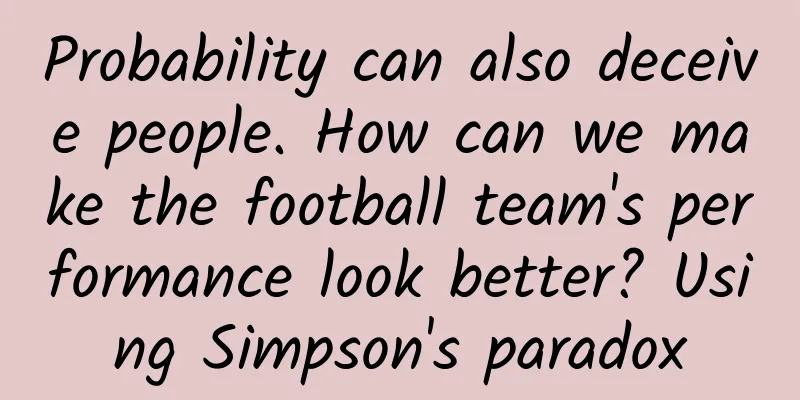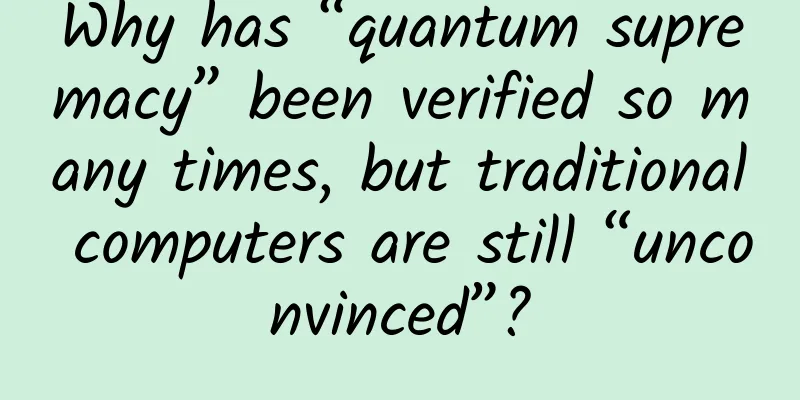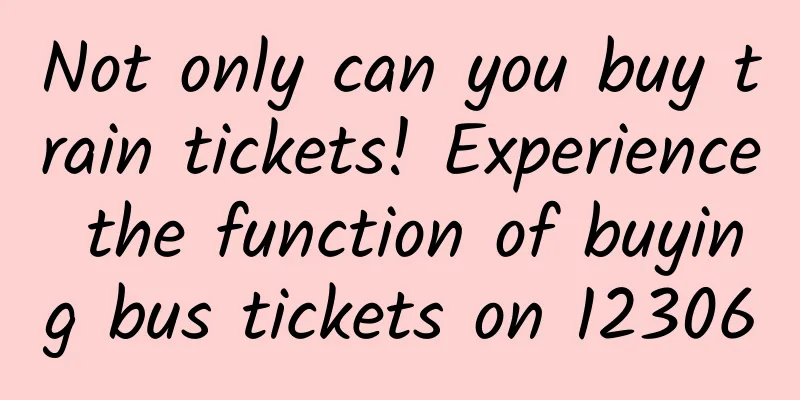Probability can also deceive people. How can we make the football team's performance look better? Using Simpson's paradox

|
In our daily work and life, we often like to analyze some problems through probability, but do you know that probability can also be deceiving? For example, suppose we have a football team with a very poor winning rate. Now we want to improve its performance. What should we do? Of course, we should strengthen training, but there is also a faster way, which is to change the calculation method of winning rate. How to change it? Let's have an example to illustrate. Suppose we now have two football teams, one with a very poor record, we named it "Sea Cucumber Team", and the other football team has a much better record, we named it "Rose Team". Let's talk about the record of the Sea Cucumber Team first. In one year, the Sea Cucumber Team played 240 games at home, of which 114 games were won, and played 60 games away, of which 6 games were won. Based on the Sea Cucumber team's one-year performance, we can calculate its winning rate, which is 47.5% at home and 10% away. Now let's take a look at the record of the Rose Team. The Rose Team played 60 games at home in a year, winning 42 of them, and played 240 games away, winning 48 of them. Based on this, we can also calculate the results of the Rose Team's games. Her home win rate is as high as 70%, and her away win rate is also 20%. It can be seen that whether playing at home or away, the Rose Team's winning rate is much higher than that of the Sea Cucumber Team. Even if the away win rate is not very high, the Rose Team's winning rate is twice as high as that of the Sea Cucumber Team. Faced with such a comparison of results, the Sea Cucumber Team is obviously embarrassed, but don't worry, there is a way. If the Sea Cucumber Team wants to make their results look good, it is actually very easy. They just need to mix the results of home and away games together and calculate them. Adding up the home and away games, the Sea Cucumber team played 300 games in a year and won 120 games. Looking at the Rose team, they also played 300 games in a year and won 90 games. According to this added data, the winning rate of the Sea Cucumber team becomes 40%, while the winning rate of the Rose team becomes 30%. The Sea Cucumber team surpasses the Rose team. Isn't it interesting? Whether playing at home or away, the Rose team's winning rate is much higher than the Sea Cucumber team, but after adding up the home and away games, the Sea Cucumber team's winning rate is higher than the Rose team. Why is this so? Obviously, in the above problem, we were deceived by probability. In the world, Edward Simpson was the first to discuss this probability problem in detail, so this problem is called "Simpson's Paradox". We know that we are deceived by probability, but how does probability deceive us? Looking carefully at the previous examples, you will find that the Sea Cucumber team played a lot of home games, while the Rose team played a lot of away games. We all know that home games are relatively easy and easier to win. That is to say, in a total probability problem, doing more easy things can effectively increase the overall probability. Understanding this, we can apply it to all aspects of life. Suppose your leader asks you and several other sales departments to develop a promotion plan, and use the final sales completion rate to judge the pros and cons of each plan, then we can use Simpson's paradox. It is very difficult to stand out in the production of promotional plans, but we can try to improve the sales completion rate in the sales process. In the process of implementing the promotional plan, promotional outlets will be set up in different places, and the sales situation in some areas is better than other areas, so we should set up more promotional outlets in these places, so that the overall sales completion rate will naturally go up. There are many similar examples. For example, when studying, which subject should we focus on? Of course, those subjects that are easier to improve scores, so as to effectively increase the total score. In the same subject, those types of questions that are easier to improve scores are our focus. Sometimes, even if you apply Simpson's paradox, you still fail to gain a probability advantage. What should you do? Taking the previous football team problem as an example, if the home and away games of the Sea Cucumber Team and the Rose Team are not much different, even if the Simpson's paradox is used, the record comparison cannot be made good. It doesn't matter. We can look for favorable stratification probabilities, such as trying to divide winter games and summer games, or dividing rainy day games and sunny day games. If we spend more time, we can always find some classification methods to make the record look good. But this is just a trick after all. If the team's strength cannot be truly improved, the fig leaf will eventually be torn off. Now we know that probability can also deceive people, so before analyzing the problem through probability, we must first figure out what the probability in front of us represents. For more information, please follow the official account: sunmonarch |
<<: Is the sale of betel nut banned just because it causes cancer?
>>: If you don’t want your bones to become brittle, you must avoid doing these 4 things!
Recommend
The display forms and monetization of online alliance promotion!
An online alliance is a group of websites and sel...
Two major channels for Tik Tok to get free traffic!
There is always not enough traffic for the video,...
Don’t keep posting about Mercury retrograde on your Moments! You can’t blame Mercury for your bad luck
Hello everyone, I am Mercury, the most wronged pl...
A tomato can cure your procrastination...procrastination?
When studying, have you ever been troubled by the...
Toilet paper in many parts of the world has been exposed to contain carcinogens. In fact, many items also contain carcinogens. Is there a need to worry?
Recently, the British newspaper The Guardian repo...
Wang Ce VLOG personal short video experience sharing class
Wang Ce VLOG personal short video experience shar...
Are you in the right shape for hula hooping? Mathematicians prove it →
Compiled by: Gong Zixin Mechanical systems with m...
Profit as soon as you buy it: iPhone 13 depreciates 50% lower than iPhone 12
According to the latest report from SellCell (Int...
Why isn’t carpooling popular in China?
After a year-long battle between Tencent's We...
As mobile phone screens get bigger and bigger, what challenges do UX designers face?
Editor's note: Since the iPhone X was launche...
Are sprouted potatoes poisonous? Eating these 9 foods incorrectly can cause "poisoning", so be careful when eating them!
Recently, the news #Girl fainted and was sent to ...
The counterfeiter is back! Japanese car manufacturers are showing their craftsmanship again, but will they be completely wiped out this time?
Do you remember the various "immortals"...
91 Ten Articles: Ford executive Zhu Jiang may join Xiaomi Motors, Volkswagen electric vehicle deliveries doubled
1. Zhu Jiang, Chief Operating Officer of Ford Chi...
Watching 3D movies, doing a "physical examination" on food... all rely on it! What is "light" so powerful?
Polarized light, a seemingly simple optical pheno...
Planning and promotion: an advanced guide to planning! (recommended collection)
Most planners have heard of theories such as USP,...









